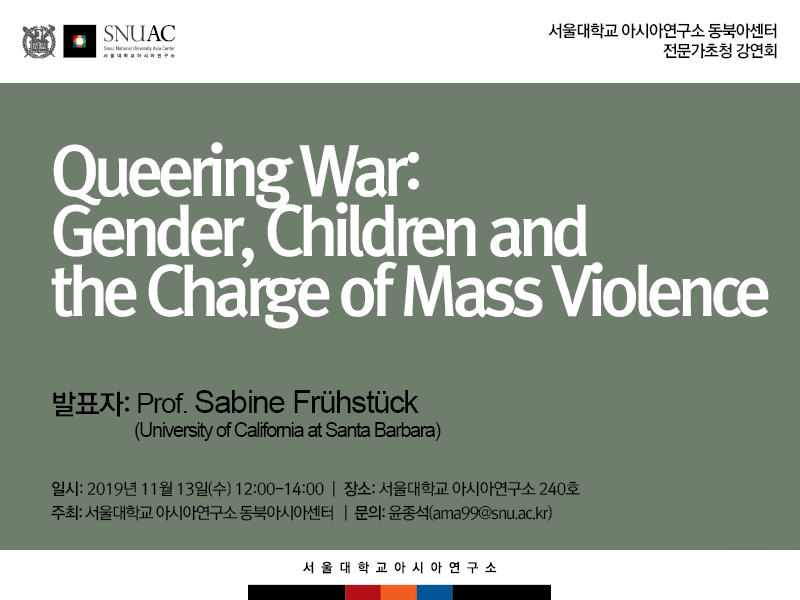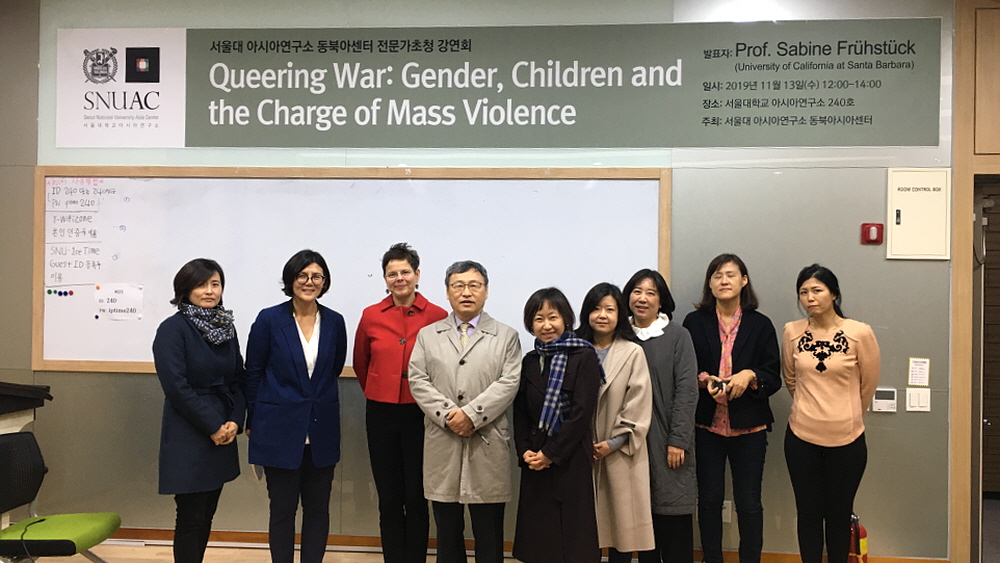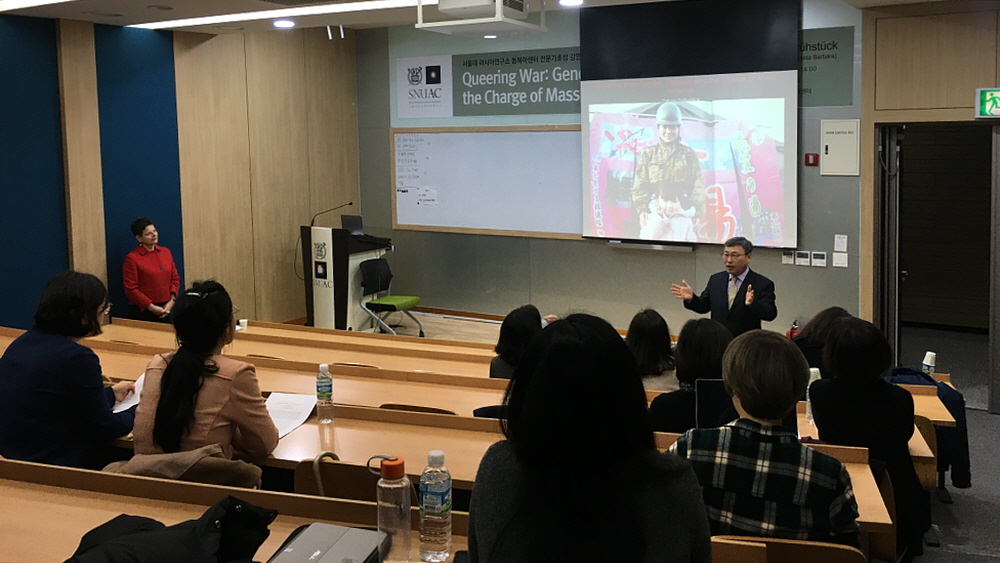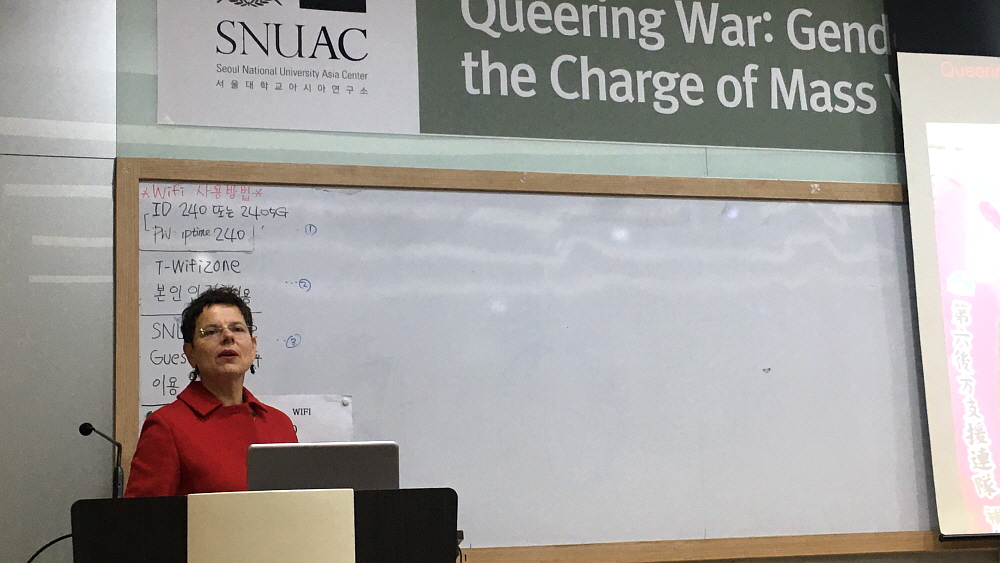
Queering War: Gender, Children and the Charge of Mass Violence
- Date: November 13th, Wednesday, 2019 12:00-14:00
- Location: Room 240, SNUAC (Bldg. 101)
Sabine Frühstück
Koichi Takashima Chair in Japanese Cultural Studies
Professor, Department of East Asian Languages & Cultural Studies
University of California at Santa Barbara
fruhstuck@eastasian.ucsb.edu
http://www.eastasian.ucsb.edu/people/faculty/sabine-fruhstuck/
Sabine Frühstück is the Koichi Takashima Chair in Japanese Cultural Studies at the University of California at Santa Barbara. She is mostly interested in the study of modern and contemporary Japanese culture and its relationships to the rest of the world. Frühstück has published widely on the ageing of society, gender and sexuality, the military, war and violence, and childhood and play in modern and contemporary Japan. Her recent publications include Playing War: Children and the Paradoxes of Modern Militarism in Japan (University of California Press, 2017) and Child’s Play: Multi-sensory Histories of Children and Childhood in Japan (co-edited with Anne Walthall, University of California Press, 2017). She is currently completing a monograph on Gender and Sexuality in Modern Japan that is contracted with Cambridge University Press.
Queering War: Gender, Children and the Charge of Mass Violence
Not since the beginning of the twentieth century has a newly fervent rhetoric about the condition and future of Japan’s children and childhood so closely coincided with an equally heated debate about (the specter of) Japan’s rise as a military and war-making power. In debates regarding both issues, the figure of the child has been rhetorically mobilized to represent both national decline and a weakening of the late capitalist belief in a yet brighter, richer, and happier future. At the same time, children and their emotional value—replete with their presumed vulnerability, innocence, and sweetness, which has been so regularly utilized over the decades—appear to today hold more use value with the military than at any other moment since the end of the Asia-Pacific War. Yet, the terrain has shifted: the militarization of childhood of the modern era has lost ground to and is closely intertwined with the ever-multiplying mechanisms that further the infantilization of militarism.
In this talk, Frühstück analyzes various modes of “Queering War”—the ways the Self-Defense Forces and the U.S. Forces Japan have manipulated the categories of childhood and war in order to appeal to (eventually recruitable) children. While military recruitment materials around the world have claimed the capacity to turn formerly unformed and directionless children into adults and, particularly, boys into men, the Self-Defense Forces, more than any military establishment elsewhere, has taken a different route, instead variously infantilizing, feminizing, and sexualizing service members, potential recruits, and sympathizers. Such efforts are the means by which the Self-Defense Forces’ public relations apparatus attempts to ensure its viability in an environment marked by the contentious legacy of Japan’s imperialist war in Asia—as well as by an ever-shrinking population, whose young generation shows next to no signs of a will to war, thus potentially hampering the current administration’s aspirations.
SNUAC Northeast Asia Center invited Professor Sabine Frühstück (University of California at Santa Barbara) for a lecture on the changes in contemporary Japanese society with the topic “Queering War: Gender, Children and the Charge of Mass Violence” on November 13th.
Prof. Frühstück illuminated how the U.S. Forces in Japan have manipulated the categories of childhood and war in order to appeal to children, and critically analyzed that mass violence from a gender studies point of view is being justified through tactful propaganda and manipulations on children. Photos, animations, and video materials showed that while military recruitment materials generally utilize masculinity as their major means, the Self-Defense Forces in Japan have instead infantilized, feminized, and sexualized service members, potential recruits, and sympathizers. Prof. Frühstück suggested that such promotional strategy of the Self-Defense Forces is at once an attempt to ensure its viability in an environment marked by the contentious legacy of Japan’s imperialist war in Asia as well as a response to an ever-shrinking population, whose young generation shows next to no signs of a will to war, thus potentially hampering the current administration’s aspirations. As she continued a discussion with the participants, she also shared her gender theory approach to the changes in contemporary Japanese society.




